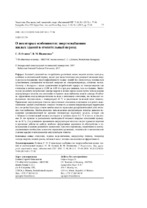О некоторых особенностях энергоснабжения жилых зданий в отопительный период

Date
2017Publisher
Another Title
Some Features of the Power Supply of Residential Buildings during the Heating Season
Bibliographic entry
Осипов С. Н., Пилипенко В. М. О некоторых особенностях энергоснабжения жилых зданий в отопительный период = Some Features of the Power Supply of Residential Buildings during the Heating Season / С. Н. Осипов, В. М. Пилипенко // Энергетика. Известия высших учебных заведений и энергетических объединений СНГ. – 2017. – № 1. – С. 77–96.
Abstract
Большой удельный вес потребления различных видов энергии жилым сектором, особенно в отопительный период, делает уже недостаточным для реальной экономии энергоресурсов повышение энергоэффективности только зданий без учета потерь топлива при существенном уменьшении почасовой нагрузки на электрогенераторы, особенно ночью. Поэтому в Беларуси с целью привлечения потребителей тарифы на электроэнергию для отопления в ночное время (с 23:00 до 6:00 ч) в три раза дешевле, чем в остальное. Значительно увеличить потребление электроэнергии в ночное время можно путем использования аккумуляторов теплоты для отопления и горячего водоснабжения жилого сектора. Особенно эффективны аккумуляторы теплоты на воде и напольного отопления, что позволяет использовать теплоноситель с температурой 40С и увеличивает полезный запас теплоты. Применение аккумуляторов теплоты для суточного отопления, вентиляции и горячего водоснабжения зданий существенно снижает стоимость создания инфраструктуры территории под застройку благодаря отмене необходимости прокладки распределительной сети тепло- или газоснабжения. Необходимостью использования аккумуляторов теплоты является повышение средневзвешенной по времени температуры наружного воздуха, которое для г. Минска в отопительный период составляет в среднем около 0,1С в год и за последние 20 лет привело к уменьшению необходимой тепловой нагрузки помещений примерно на 10 %. Для успешного применения аккумуляторов теплоты следует провести научные и проектные работы по выбору наиболее эффективных вариантов их обустройства и использования в зданиях различного назначения. При этом строителям, энергетикам и эксплуатационникам необходимо совместно определить временные, технические и экономические условия зарядки и использования аккумуляторов теплоты.
Abstract in another language
A large proportion of consumption of different types of energy by the residential sector, especially in the heating period, makes the energy efficiency of buildings without considering the loss of fuel with a significant reduction in hourly load on the generators, especially at night, already insufficient for real energy savings. Therefore in Belarus, in order to attract the consumer, electricity tariff for heating at night hours (from 11 p.m. to 6.00 a.m.) is three times cheaper than at any other time. Significant increase of the electricity consumption of at night could be achieved by using heat accumulators for heating and hot water supply to the residential sector. Particularly effective are water accumulators of heat and accumulators of underfloor heating that enable to use a coolant with a temperature of 40 оC and to increase the useful supply of heat. The use of heat accumulators for daily heating, ventilation and hot water supply of buildings significantly reduces the cost of creating the infrastructure of the territory under construction by eliminating the necessity of running the distribution network of heat or gas supply. The use of the heat accumulators is necessary due to the increase of the time-weighted average outdoor temperature. The mentioned increase in the City of Minsk in the heating season is of about 0.1 °C per year in average, and as for the last 20 years, the increase has led to a reduction of the required heat load on the premises by about 10 %. Research and project work on choosing the most effective options for the arrangement and use the heat accumulators in buildings of the various functions ought to be fulfilled in order to make the application of heat accumulators successful. In this respect civil and power engineers as well as operators should work together so to determine the chronological, technical and economic conditions of charging and use of heat accumulators.
View/
Collections
- №1[7]
